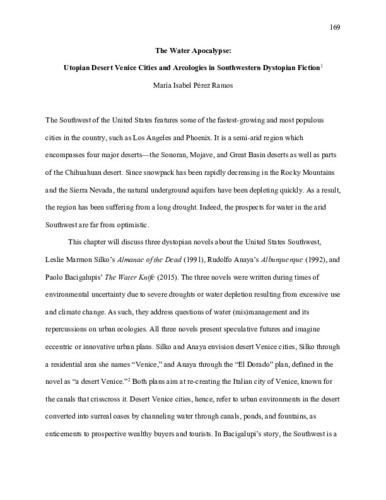The Water Apocalypse: Venice Desert Cities and Utopian Arcologies in Southwestern Dystopian Fiction
Autor(es) y otros:
Editor/Coord./Trad.:
Palabra(s) clave:
Water management
Arcologies
Desert Venice
Dystopia
Environmental Ethics
Almanac of the Dead
Alburquerque
The Water Knife
Urban environments
Fecha de publicación:
Editorial:
University Press of Mississippi
Versión del editor:
Citación:
Resumen:
Numerous stories have and are being written in both fiction and non-fiction about the future of the United States’ Southwest; and nearly always that future is considered to be closely linked to the vicissitudes of water. In a multidisciplinary work that combines ecocriticism, environmental history, and decolonial theories, this paper analyzes the socio-technological complexities behind water (mis)management in the Southwest with a focus on urban environments, and their socio-environmental consequences. A lush sprawl development called ‘Venice’ is proposed in Arizona in Leslie Marmon Silko’s Almanac of the Dead (1991). In the same line, Chicano author Rudolfo Anaya presents struggles over water rights and plans for turning Albuquerque into a ‘desert Venice’ city in his novel Alburquerque (1992). Fictional plans like these become very real when one reads the posts and news about the water-demanding Santolina sprawl development currently proposed for Albuquerque’s West side. On another note, Paolo Bacigalupi’s last novel, The Water Knife (2015) presents arcologies (self-contained, self-sufficient buildings) as an option to escape what he perceives will be a hellish region when climate change worsens and water underground levels are eventually depleted. Migration, xenophobia and environmental re-adaptation then become central issues to consider. A nuanced decolonial analysis of these dystopian narratives calls into question current decision-making around water management in the Southwest through the perspectives of these authors. If one argues that the environmental degradation of the arid Southwest is partly a consequence of the cultural oppression of the native local inhabitants, by imposing an inappropriate socio-environmental culture and ethics over the region, dystopian novels such as these become all the more relevant when proposing alternative futures.
Numerous stories have and are being written in both fiction and non-fiction about the future of the United States’ Southwest; and nearly always that future is considered to be closely linked to the vicissitudes of water. In a multidisciplinary work that combines ecocriticism, environmental history, and decolonial theories, this paper analyzes the socio-technological complexities behind water (mis)management in the Southwest with a focus on urban environments, and their socio-environmental consequences. A lush sprawl development called ‘Venice’ is proposed in Arizona in Leslie Marmon Silko’s Almanac of the Dead (1991). In the same line, Chicano author Rudolfo Anaya presents struggles over water rights and plans for turning Albuquerque into a ‘desert Venice’ city in his novel Alburquerque (1992). Fictional plans like these become very real when one reads the posts and news about the water-demanding Santolina sprawl development currently proposed for Albuquerque’s West side. On another note, Paolo Bacigalupi’s last novel, The Water Knife (2015) presents arcologies (self-contained, self-sufficient buildings) as an option to escape what he perceives will be a hellish region when climate change worsens and water underground levels are eventually depleted. Migration, xenophobia and environmental re-adaptation then become central issues to consider. A nuanced decolonial analysis of these dystopian narratives calls into question current decision-making around water management in the Southwest through the perspectives of these authors. If one argues that the environmental degradation of the arid Southwest is partly a consequence of the cultural oppression of the native local inhabitants, by imposing an inappropriate socio-environmental culture and ethics over the region, dystopian novels such as these become all the more relevant when proposing alternative futures.
Descripción:
Este capítulo de libro es una versión revisada y condensada del artículo publicado en Ecozon@: European Journal of Literature, Culture and Environment, vol. 7, no. 2, 2016, pp. 44-64. ISSN 2171-9594.
ISBN:
Patrocinado por:
Ministerio de Ciencia e Innovación, Ayuda Juan de la Cierva-Formación; Principado de Asturias GRUPIN (IDI/ 2018/ 000167); y MCIU/AEI/FEDER, UE proyecto RTI2018-097186-B-I00
Colecciones
Ficheros en el ítem




